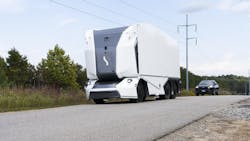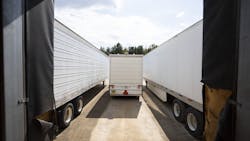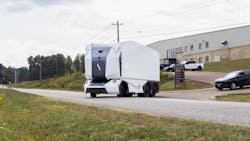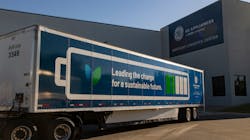GE Appliances folds EV and AV tech into fleet operations
GE Appliances is one of the first companies in the U.S. to make two emerging technologies part of its transportation operations: battery-electric and autonomous vehicles. In some locations, it's both technologies on the same truck.
The manufacturer's private fleet has deployed a fleet of Einride EVs to haul freight between GE Appliances' inbound warehouses and manufacturing facilities in Kentucky, Georgia, and Tennessee. In Tennessee, some of the EVs are also humanless Pods that use Einride's artificial intelligence technology to haul goods.
"The move has improved our efficiency and reliability as well as lowered the cost of moving manufacturing materials and components in several critical segments of our supply chain," Harry Chase, senior director of central materials at GE Appliances, told FleetOwner.
See also: Autonomous, electric, and the 'truck of the future'
Chase said his job includes "finding the most efficient way to move materials from both a cost and sustainability perspective to supply our nine U.S. plants."
That led the appliance giant, a subsidiary of Haier, to Einride. The freight mobility technology company is merging two of the most significant developments in transportation this century: EV and AV.
"Many companies are focused on either EV or AV tech without exploring the benefits of combining the two," Niklas Reinedahl, GM of North America at Einride, told FleetOwner. "While they both provide powerful solutions on their own, Einride's pairing of EV and AV tech enables us to maximize sustainability and efficiency."
He said that fleets in the U.S. and Europe using Einride's equipment have reduced CO2 emissions by 95% compared to the diesel tractors they replaced. "Self-driving technology allowed us to remove drivers from the trucks and put them in remote operations while also designing cabless trucks that are more aerodynamic," Reinedahl said. "As a result, we save precious weight that maximizes the charge of a battery and extends the range of our trucks."
Chase said that GE Appliances has been working to reduce its carbon footprint across the U.S., where the company says its products are in half of all homes. Over the past six years, the appliance company has invested $2 billion in its nine U.S. plants and distribution centers.
"We saw an opportunity to deploy Einride's EV technology on routes we frequently use to move materials," Chase added. "That's where the use of these vehicles can have a big impact on reducing emissions and costs."
An EV/AV 'historic milestone'
Last year, Einride and GE Appliances worked with the National Highway Traffic Safety Administration and other state and local officials in Tennessee to allow the cab-less freight transporters to operate on public roads without a safety driver on board. The Einride Pods are monitored remotely.
"In October last year, we successfully completed a public road pilot together with GE Appliances in Selmer, Tennessee," Einride's Reinedahl said. "This was a historic milestone as there had never been an electric, autonomous vehicle without a driver on board on U.S. public roads before."
See also: New trucking coalition looks to set realistic decarbonization path
Today, the EV trucks move appliance parts and components on routes between the appliance company's inbound warehouses and manufacturing facilities in Kentucky, Georgia, and Tennessee. "As our operations have grown in the U.S., we have a strategy of consolidation and de-consolidation to synchronize material flow into the plants," Chase said. "The EV vehicles have replaced diesel-powered vehicles on these high-frequency loops to supply the plants."
The trucks have a range of 200 miles per charge, and Chase expects them to run about 125,000 miles annually, which he said would eliminate 210 tons of CO2 emissions within the first year. Einride would not disclose the breakdown in EV and AV equipment that GE Appliances is using, only noting that the company has both AV and EV Einride trucks operating in three states.
Chase said that the EV/AV trucks are being used in the following locations:
Georgia: Trucks are routed between the Georgia Port Authority's Appalachian Regional Port, GEA's nearby Southern Logistics Center in Crandall, and Roper Corporation, GEA's cooking products manufacturing subsidiary in LaFayette.
Kentucky: Trucks travel from the company's Kentucky Logistics Center to GEA's massive Appliance Park campus, carrying parts that make GE, GE Profile, and Café refrigerators.
Tennessee: Starting in April, the focus will be moving finished Monogram refrigerators from the manufacturing facility to the warehouse to await shipping to customers.
The infrastructure hurdle
Like other fleets seeking to fold battery-electric vehicles into their operations, the electricity can be the hardest part.
"Initially, one of the biggest challenges was procuring the charging infrastructure due to the high demand throughout the U.S.," Chase said. "Otherwise, the ongoing maintenance and operations of electric vehicles are less complex than diesel. The biggest benefit has been for the drivers as they see ergonomic benefits of reduced vibration and noise."
See also: Feds help fund freight decarbonization projects from coast to coast
Reinedahl said that Einride's future depends on better charging infrastructure across the U.S. "We are establishing charging infrastructure for heavy-duty vehicles," he said. "Charging is the key to fleet electrification, and the charging network powers Einride's ecosystem and enables seamless transitions into fleet charging. The establishment of Einride Stations has already started in Europe, and we are building the first Einride Station in the U.S., near the Port of Los Angeles. This L.A. station begins construction later this year, will have 65 chargers, and will be a pivotal enabler in the deployment of Einride trucks."
The company intends to install Einride Stations on customer sites and along customer routes, which Reinedahl said would be interlinked and part of "long-haul green corridors. "Einride's model of charging allows for quicker and better electrification with less capital investment," he explained. "Our charging infrastructure model will enable us to deliver our services in greater volume and at a faster pace. We also hope this will speed up the transition to electric and encourage others to invest in charging."
While Chase said that GE Appliances has no expansion plans to announce now, he said that as the technology improves and "charging infrastructure becomes more accessible, we will likely expand to additional routes that encompass greater distances."
About the Author
Josh Fisher
Editor-in-Chief
Editor-in-Chief Josh Fisher has been with FleetOwner since 2017. He covers everything from modern fleet management to operational efficiency, artificial intelligence, autonomous trucking, alternative fuels and powertrains, regulations, and emerging transportation technology. Based in Maryland, he writes the Lane Shift Ahead column about the changing North American transportation landscape.




